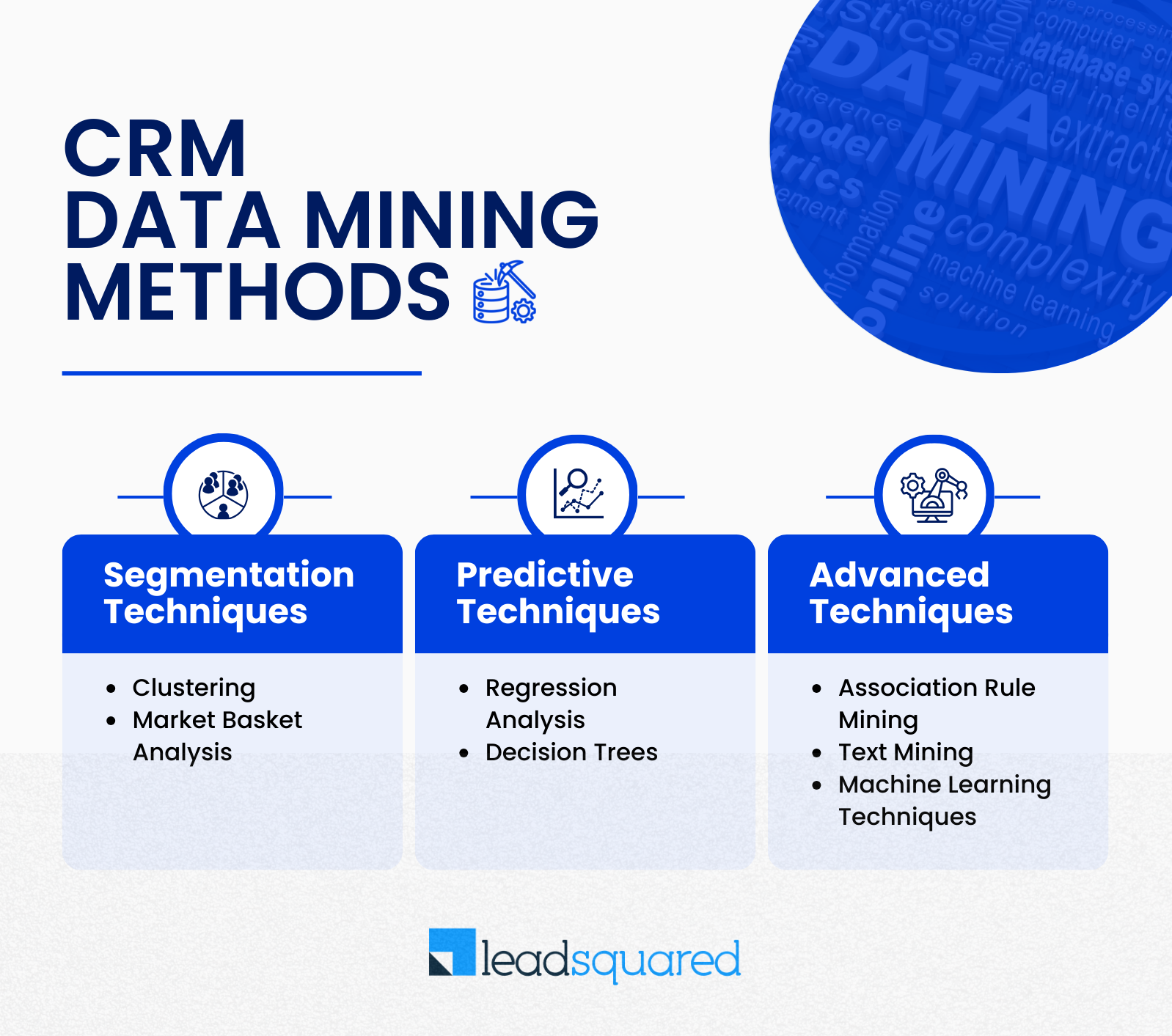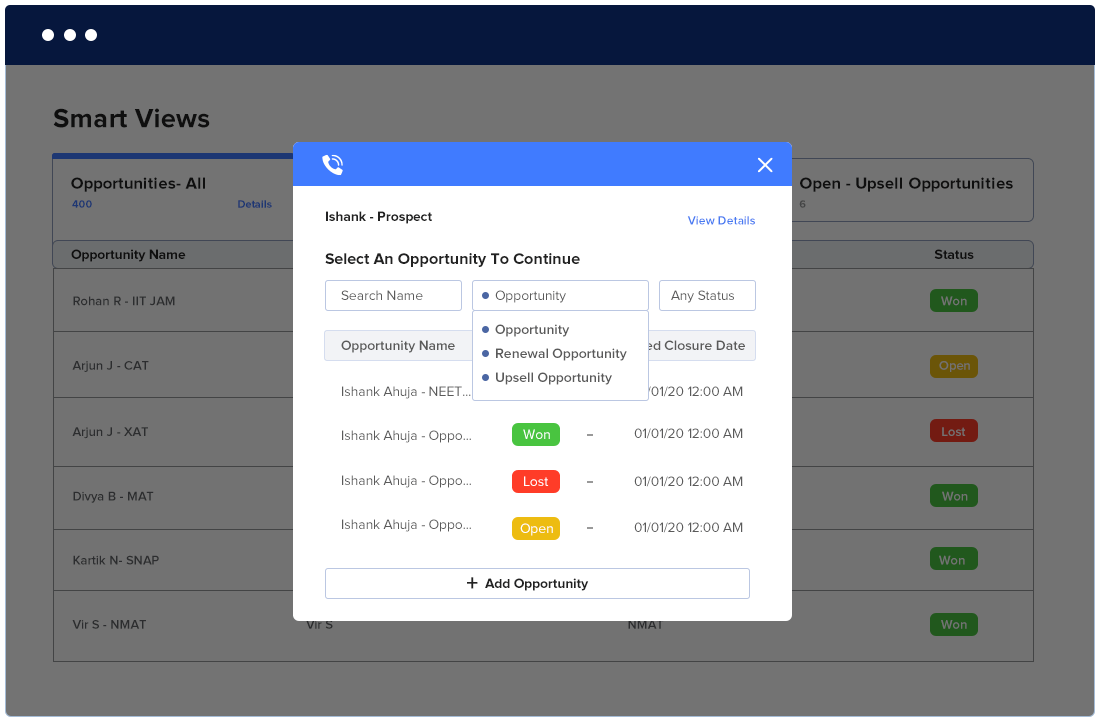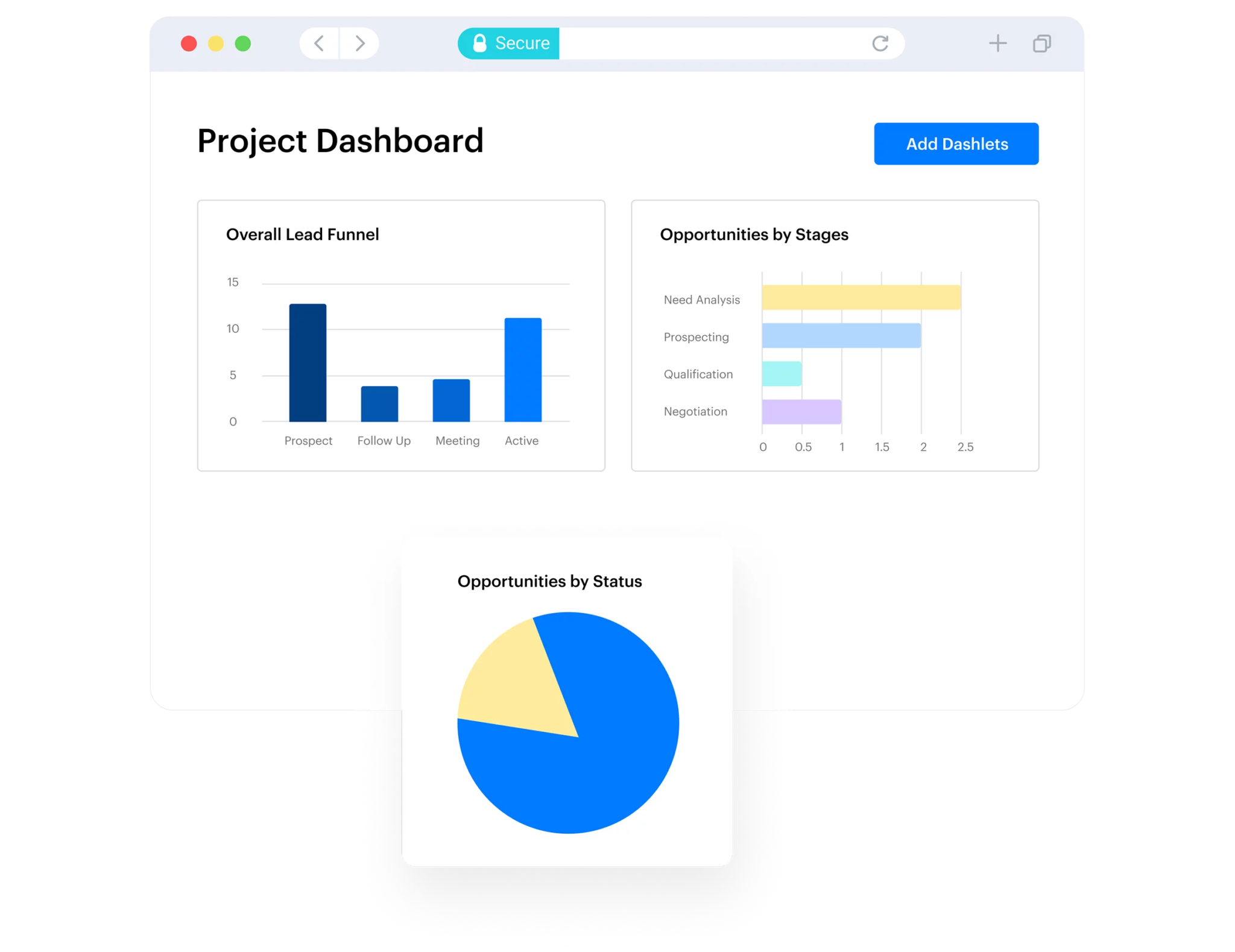Data mining in CRM is all about uncovering hidden gems of information buried within the vast amount of data collected by Customer Relationship Management (CRM) systems. By sifting through this data with sophisticated algorithms, businesses can find patterns and trends that would otherwise be difficult to see.
How Does It Work?
Here’s a breakdown of how data mining in CRM works:

- Data Collection: CRM systems gather a lot of customer information, including purchase history, contact details, preferences, and support interactions.
- Unearthing Patterns: Data mining techniques use statistical models and algorithms to analyze this data and identify hidden patterns. These patterns can reveal things like customer behavior, buying habits, and potential areas for improvement.
- Actionable Insights: Once these patterns are discovered, businesses can use them to make better decisions. This could involve things like targeted marketing campaigns, personalized customer service, or product development strategies.
In essence, data mining in CRM helps businesses transform customer data into actionable insights, leading to stronger customer relationships, improved sales, and better overall business performance.
Different Ways to Mine CRM Data
There are several techniques used to mine CRM data, each suited to uncovering different insights. Here’s a breakdown of some common methods:

1. Segmentation Techniques
- Clustering: This groups customers with similar characteristics together. It helps identify different customer segments with unique needs and preferences, allowing for targeted marketing campaigns or product development strategies.
- Market Basket Analysis: This identifies products frequently purchased together. This can inform product placement strategies or help create targeted product bundles.
2. Predictive Techniques
- Regression Analysis: This helps predict future values based on historical data. It can be used to forecast sales, identify churn risk (likelihood of a customer leaving), or predict customer lifetime value.
- Decision Trees: This creates a tree-like model that predicts future outcomes based on a series of questions. It can be used to personalize customer recommendations or predict customer behavior.
3. Advanced Techniques
- Association Rule Mining: This discovers relationships between different data points. It can help identify patterns in customer behavior or product preferences.
- Text Mining: This analyzes textual data like customer support interactions or survey responses. It can be used to understand customer sentiment or identify common customer pain points.
- Machine Learning: This involves algorithms that learn from data without explicit programming. It can be used to personalize customer experiences, automate tasks, or detect fraudulent activity.
These are just some of the ways to mine CRM data. The best technique will depend on the specific business goals and the type of data available. Many CRM systems offer built-in data mining functionalities or integrate with data mining tools for a more in-depth analysis.
Practical Use Cases of Data Mining in CRM
Data mining in CRM unlocks a treasure trove of possibilities for businesses by extracting valuable insights from customer data. Here are some key use cases that translate mined data into real-world benefits:
1. Upselling and cross-selling
Data mining can identify products that customers frequently purchase together. This allows businesses to recommend relevant products or services, increasing sales opportunities and overall revenue.
For instance, using built-in CRM functionalities in CRMs like LeadSquared, one can easily spot upselling and cross-selling signals and pitch relevant products to the client.

2. Customer segmentation
Data mining helps categorize customers into distinct groups based on shared characteristics, purchase history, and behavior. This allows for targeted marketing campaigns, personalized product recommendations, and tailored customer service experiences.
3. Sales forecasting
By analyzing sales trends and customer behavior patterns, data mining can predict future sales figures. This enables businesses to optimize inventory management, allocate resources effectively, and prepare for sales fluctuations.
4. Customer retention
Data mining can identify customers at risk of churning (stopping business). By analyzing past churn cases and flagging similar patterns, businesses can proactively reach out with targeted retention campaigns or loyalty programs.
5. Product development and innovation
Data mining can reveal customer preferences, buying habits, and unmet needs. This valuable information can inform product development strategies, leading to the creation of products that resonate better with target audiences.
6. Customer service
By analyzing customer support interactions, data mining can identify recurring issues and areas for improvement. This can help businesses optimize their customer service processes, reduce resolution times, and improve customer satisfaction.
7. Fraud detection
Data mining algorithms can analyze purchase patterns and identify anomalies that might indicate fraudulent activity. This proactive approach can help businesses prevent financial losses and protect their customers.
These are just a few examples, and the possibilities are ever-expanding as data mining techniques continue to evolve. By leveraging the power of data mining in CRM, businesses can gain a deeper understanding of their customers, personalize their offerings, and make data-driven decisions that lead to sustainable growth and success.
Tools That Help Mine CRM Data
There are two main approaches to mining CRM data:
- Built-in CRM functionalities: Many CRM systems offer built-in reporting and data analysis tools. These tools allow you to generate reports, create dashboards, and perform basic data analysis tasks like filtering, grouping, and calculating metrics.
- External data mining tools: For more advanced data mining needs, businesses can utilize external data mining tools. These tools offer a wider range of functionalities and can handle complex data analysis tasks.
Here are some categories of external data mining tools commonly used with CRM data:
1. Business Intelligence (BI) Tools
These tools provide a centralized platform for data analysis and visualization. They allow you to connect to your CRM system and other data sources, create interactive dashboards, and perform complex data analysis tasks like trend analysis and forecasting.
Examples: Microsoft Power BI, Tableau, Qlik Sense, Domo
2. Data Analytics Tools
These tools offer a wider range of statistical and machine learning algorithms for data analysis. They can be used for tasks like customer segmentation, churn prediction, and sentiment analysis of customer interactions.
Examples: Sisense, SAS Enterprise Miner, IBM SPSS Modeler
3. Open-source Data Mining Tools
For those comfortable with coding, there are open-source data mining tools available like Weka and RapidMiner. These tools offer a wide range of functionalities but require some programming expertise to use effectively.
Examples: RapidMiner, KNIME, Weka
Choosing the right tool to mine CRM data depends on:
- Your technical expertise
- The complexity of your data mining needs
- Your budget
- The data mining tool’s integration capabilities with your CRM
- Data security
- Ease of use
By understanding the different tools available and carefully considering your needs, you can choose the right data mining solution to unlock the valuable insights hidden within your CRM data.
Leveraging Built-in CRM functionalities to Gain Customer Insights
Built-in CRM functionalities offer a good starting point for mining your CRM data, especially for businesses that are new to data mining or have simpler needs. While they may not offer the advanced capabilities of external data mining tools, they can provide valuable insights with a user-friendly approach.
Here’s a breakdown of some common functionalities found in most CRM systems.
1. Data reporting and analytics
CRM tools allow you to generate reports on various aspects of your customer data. These reports can include:
- Sales Reports: Track sales performance by salesperson, product, or region. Identify top-performing products and areas for improvement.
- Marketing Reports: Analyze the effectiveness of marketing campaigns by tracking metrics like click-through rates and conversion rates.
- Customer Service Reports: Identify trends in customer support interactions and areas where you can improve customer satisfaction.
For example, with LeadSquared’s SIERA, the reporting powerhouse, you can get a bird’s eye view of everything that’s important to you.

2. Data visualization
CRM software can offer data visualization tools like charts and graphs to represent your data in an easily digestible format. This allows you to see patterns and trends that might be difficult to identify in raw data tables.
3. Segmentation and filtering
CRM system allow you to segment your customer data based on various criteria, such as demographics, purchase history, or behavior. This enables you to target specific customer groups with personalized marketing campaigns or product recommendations. You can also filter data to focus on specific areas of interest, like customers at risk of churning or high-value customers.
4. Dashboards
CRMs offer customizable dashboards that provide a real-time overview of key metrics. These dashboards can include important sales figures, customer support metrics, and marketing campaign performance indicators, allowing you to monitor your business performance at a glance.
5. Workflow automation
Some advanced CRMs offer workflow automation features that can automate tasks related to data mining. For example, you can set up automated alerts to notify you of potential customer churn or identify opportunities for upselling or cross-selling.
In Conclusion
Buried in data lies the key to better sales, happier customers, and higher growth. Analyze your CRM data to understand what works, personalize experiences, and predict future success.
LeadSquared CRM’s data dashboards turn customer interactions into actionable insights. Track sales performance, optimize campaigns, and predict churn – all in one place. Boost your ROI with data-driven sales and marketing strategies. Try LeadSquared CRM today!








![[Webinar] Field Sales 101: 3x Your Team's Efficiency in 2025](https://www.leadsquared.com/wp-content/uploads/2025/01/Field-sales-101-webinar-popup.gif)